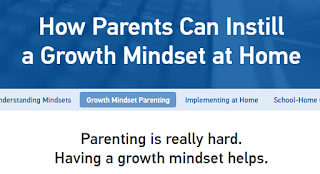Research shows that parents can have a powerful impact on their children's mindsets. The language you use and the actions you take show your children about what you expect. Giving process praise, talking about the brain, accepting mistakes as learning opportunities, and understanding the role of emotions in learning are all practices you can begin today.
Say This, Not That
The way we praise our children can have a profound impact on their mindset. Research on praise and mindsets shows that when we praise children for being smart, it promotes a fixed mindset. It sends a message that their accomplishments are trait-based, and tied to something innate. In contrast, praising kids for working hard promotes a growth mindset. It sends a message that the child’s effort is what led them to success. Want more tips on what to say, and what not to say, when praising your kids? Say This, Not That!
Please click on the article below for sample dialogue.
The way we praise our children can have a profound impact on their mindset. Research on praise and mindsets shows that when we praise children for being smart, it promotes a fixed mindset. It sends a message that their accomplishments are trait-based, and tied to something innate. In contrast, praising kids for working hard promotes a growth mindset. It sends a message that the child’s effort is what led them to success. Want more tips on what to say, and what not to say, when praising your kids? Say This, Not That!
Please click on the article below for sample dialogue.
Talk About the Brain
The brain is far more malleable than we once thought. Teaching our kids that they actually have control over growing their brains through the actions they take is empowering! Tell your children that when they work hard, that’s the feeling of their neurons connecting. The dendrites are reaching out to other dendrites, trying to connect to make a stronger brain. What strengthens those connections is practice, asking questions, and actively participating in learning. When children learn that their brains physically change with effort, it leads to increased motivation and achievement. Show your kids this Brain Animation video to explain!
Accept Mistakes as Learning Opportunities
One of the best ways you can model a growth mindset is to speak candidly about the mistakes you’ve made, and what you’ve learned from them. Speak positively about your mistakes and struggles, and this will show your children that taking risks and making mistakes are a natural part of the learning process. Explain to your children that trying hard things is what helps us grow, and you can’t be perfect when you try something hard!
Understand the Role of Emotions in Learning
When we get angry, scared, or feel threatened, our fight or flight response is activated. This can happen anytime, whether we’re scared of a spider or scared of math! Our brains are wired to protect us when we feel threatened, and stress symptoms such as sweating, stomach cramps, and your mind going blank are completely normal. There are strategies we can use when the fight or flight response tries to take over, to help us learn. One of those strategies is called Square Breathing and it helps to break down the adrenaline that is flooding the bloodstream and preventing learning from occurring.
Please click here to read the complete article.

No comments:
Post a Comment